
Fahrenheit 451 is a 1953 dystopian novel by American writer Ray Bradbury. It presents a future American society where books have been outlawed and "firemen" burn any that are found. The novel follows in the viewpoint of Guy Montag, a fireman who soon becomes disillusioned with his role of censoring literature and destroying knowledge, eventually quitting his job and committing himself to the preservation of literary and cultural writings.

Ray Douglas Bradbury was an American author and screenwriter. One of the most celebrated 20th-century American writers, he worked in a variety of genres, including fantasy, science fiction, horror, mystery, and realistic fiction.

The Martian Chronicles is a science fiction fix-up novel, published in 1950, by American writer Ray Bradbury that chronicles the exploration and settlement of Mars, the home of indigenous Martians, by Americans leaving a troubled Earth that is eventually devastated by nuclear war.

The Illustrated Man is a 1951 collection of 18 science fiction short stories by American writer Ray Bradbury. A recurring theme throughout the stories is the conflict of the cold mechanics of technology and the psychology of people. It was nominated for the International Fantasy Award in 1952.

A scythe is an agricultural hand tool for mowing grass or harvesting crops. It is historically used to cut down or reap edible grains, before the process of threshing. The scythe has been largely replaced by horse-drawn and then tractor machinery, but is still used in some areas of Europe and Asia. Reapers are bladed machines that automate the cutting of the scythe, and sometimes subsequent steps in preparing the grain or the straw or hay.

The October Country is a 1955 collection of nineteen macabre short stories by American writer Ray Bradbury. It reprints fifteen of the twenty-seven stories of his 1947 collection Dark Carnival, and adds four more of his stories previously published elsewhere.
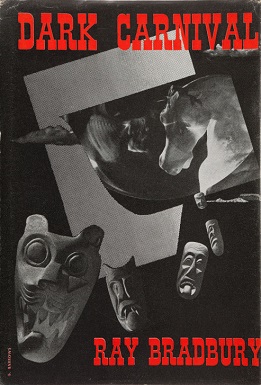
Dark Carnival is a short story collection by American writer Ray Bradbury, first published October 1947 by Arkham House. It was his debut book, and many of the stories were reprinted elsewhere.

The Golden Apples of the Sun is an anthology of 22 short stories by American writer Ray Bradbury. It was published by Doubleday & Company in 1953.

It Came from Outer Space is a 1953 American science fiction horror film, the first in the 3D process from Universal-International. It was produced by William Alland and directed by Jack Arnold. The film stars Richard Carlson and Barbara Rush, and features Charles Drake, Joe Sawyer, and Russell Johnson. The script is based on Ray Bradbury's original film treatment "The Meteor" and not, as sometimes claimed, a published short story.

The Stories of Ray Bradbury is an anthology containing 100 short stories by American writer Ray Bradbury, first published by Knopf in 1980. The hundred stories, written from 1943 to 1980, were selected by the author himself. Bradbury's work had previously been collected in various compilations, such as The Martian Chronicles and The October Country, but never in such a large volume or spanning such a long period of time.
"The Veldt" is a science fiction short story by American author Ray Bradbury. Originally appearing as "The World the Children Made" in the September 23, 1950, issue of The Saturday Evening Post, it was republished under its current name in the 1951 anthology The Illustrated Man.
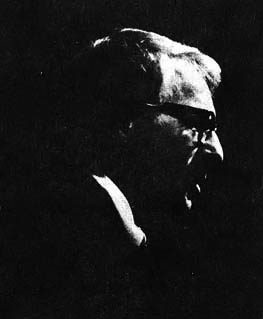
The following is a list of works by Ray Bradbury.
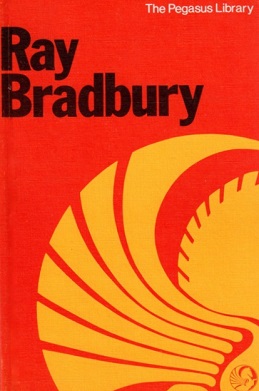
Ray Bradbury is a collection of science fiction short stories by Ray Bradbury edited by Anthony Adams and published by Harrap in 1975.
"The Aqueduct (A Martian Chronicle)" is a short story by American writer Ray Bradbury. Originally released as a limited edition chapbook, the story was subsequently collected in The Stories of Ray Bradbury in 1980.
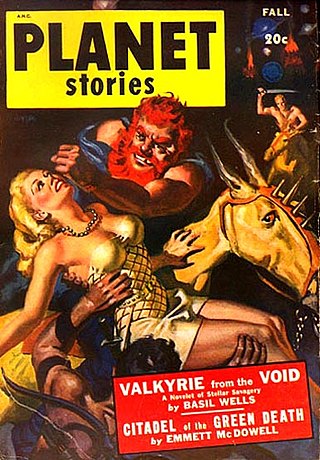
"Mars Is Heaven!" is a science fiction short story by American writer Ray Bradbury, originally published in 1948 in Planet Stories. "Mars Is Heaven!" was among the stories selected in 1970 by the Science Fiction Writers of America as one of the best science fiction short stories published before the creation of the Nebula Awards. As such, it was published in The Science Fiction Hall of Fame Volume One, 1929–1964. It also appears as the sixth chapter of The Martian Chronicles, revised as "The Third Expedition."

"The Small Assassin" is a short story by American author Ray Bradbury. It was first published in the November, 1946 issue of Dime Mystery. It was collected in Bradbury's anthology Dark Carnival and later collected in the anthologies The October Country, The Autumn People, The Small Assassin, The Stories of Ray Bradbury, and The Vintage Bradbury.

The Illustrated Man is a 1969 American dark science fiction drama film directed by Jack Smight and starring Rod Steiger as a man whose tattoos on his body represent visions of frightening futures. The film is based on three short stories from the 1951 collection The Illustrated Man by Ray Bradbury: "The Veldt," "The Long Rain," and "The Last Night of the World."
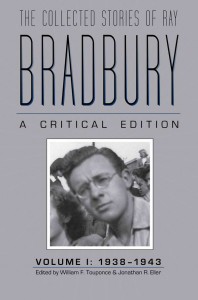
The Collected Stories of Ray Bradbury is an ongoing scholarly, multi-volume series published by Kent State University Press, aiming to collect every short story written by American author Ray Bradbury in chronological order. The series is edited by William F. Touponce and Jonathan R. Eller, with extensive textual apparatus providing critical insights and annotations. The project is expected to span eight volumes and has received approval from the Modern Language Association (MLA) for its academic rigor. Each story is edited based on Bradbury's original manuscripts, with commentary on textual variants and publication history.
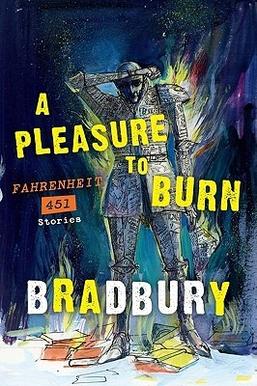
A Pleasure to Burn: Fahrenheit 451 Stories is a collection of short stories by American writer Ray Bradbury, first published August 17, 2010. A companion to novel Fahrenheit 451, it was later released under the Harper Perennial imprint of HarperCollins publishing was in 2011.

















